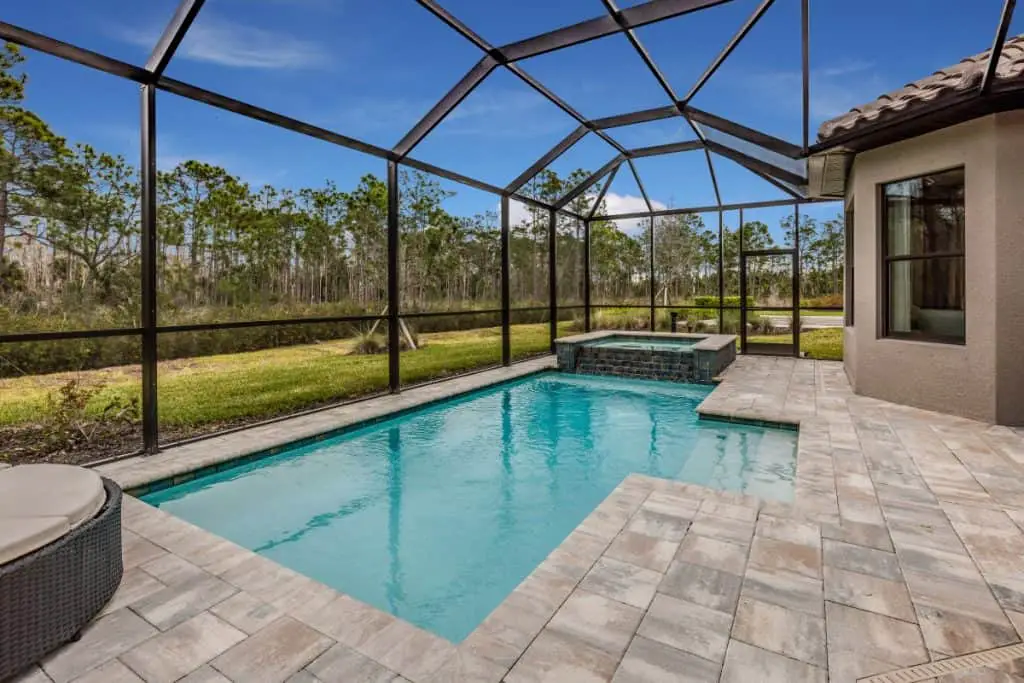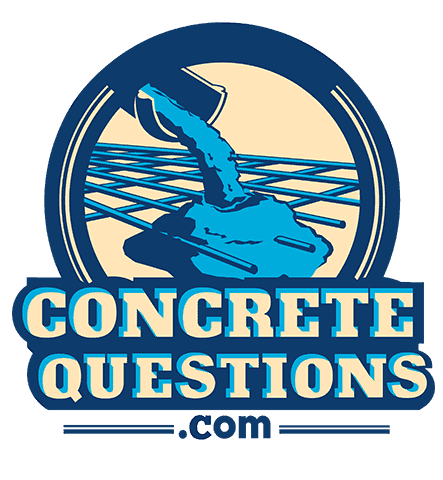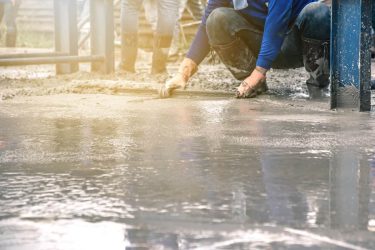The pool deck is an integral part of the overall aesthetic appeal of your pool area. This is why it’s important to give the choice of material used on it as much thought as possible. Pavers and concrete are the two most popular options, but which one is better?
When choosing which is better between pavers and concrete for a pool deck, consider your personal preferences and weigh in both materials’ pros and cons, as both are good options. Concrete is attractive and practical for most people, but pavers tend to last longer. Pavers are also more expensive.
The rest of this article will look at the different advantages and disadvantages of using both materials on your deck.

Table of Contents
Concrete Pool Deck: An Overview
A concrete pool deck is mostly an arrangement of slabs poured around the pool area and allowed to cure. You can choose to pour the deck in different shapes or have various patterns and textures pressed into it.
You can also choose to go with the standard gray concrete you’ll find in most places or introduce a tinge of color to match the wider aesthetics of your home a bit better.
Installation Costs
You should expect to pay around $14 per square foot for a concrete pool deck without stamping or any textures.
Read more: Installing Concrete Around Your Pool: The Real Cost
Installing a concrete pool deck is straightforward. However, the material takes time to cure and dry. The pool deck won’t be in use for a while until the end of the process.
The construction process will include excavation, grading, preparing the foundation, and setting forms before the concrete is poured.
Most contractors have a minimum order you must fulfill, so you may have to pay for more concrete than what you need for your pool deck.
You should also keep in mind that the grading has to be almost perfect if you choose to go with concrete for your pool deck.
Any errors in the grading can be very costly to rectify after pouring the concrete. A poor job during the concrete grading stage will cause low spots that will retain water and cause staining and discolorations.
Durability
The overall durability of any concrete deck is very good. Concrete in general can last for around 50 years and more.
However, it depends a lot on the movement of the earth. If the ground underneath shifts by the slightest of margins, the slab can split or crack.
So, the concrete slab’s surface will remain level for some time, but once the soil beneath becomes unstable, the concrete deck will crack.
Temperature fluctuations can also cause the contraction and expansion of the concrete deck.
Maintenance
Maintaining concrete is straightforward. Sweeping with a broom and cleaning the concrete from time to time will ensure grime, dirt, and stains won’t stick.
You should also coat the concrete deck using a protective sealant to keep moisture from penetrating the surface. This should be done every 3-5 years to maintain the protection.
Read this article for more information: Do You Need to Seal the Concrete Around a Pool?
However, the cracking and staining that will almost certainly occur after some time—even with a good cleaning schedule—can become unsightly as the slab gets old. If you choose to go with stamped concrete, the cracks and stains can blend into the design and stay hidden if you’re lucky.
Related article: The Homeowner’s Guide to Repairing Concrete Pool Decking
As cracks and stains become more noticeable on the surface, you’ll have to replace the entire deck or portions of it during maintenance. Weed growth through the cracks between the concrete is also a common sight.
If you don’t want to replace complete slabs when maintaining your concrete pool deck, you can choose to only work on specific segments with issues. However, the patched-up area will stand out as it’s difficult to match the existing concrete color.
It might be worth resurfacing the concrete if that is possible. Talk to a professional to get tips on the right thing to do in your situation.
Advantages of a Concrete Pool Deck
There are few advantages of choosing to go with a concrete pool deck.
Affordable
Concrete is made from inexpensive material, and it doesn’t have to be quarried. This makes the installation cost typically affordable.
The pricing across different concrete construction businesses will vary, but in the end, you can expect to pay less than what you’d spend for other pool deck options.
Highly Flexible
Concrete can be dyed and stained in different ways. You can also infuse patterns and textures in the design, so many pool owners use concrete as a means to express their artistic and aesthetic choices.
However, many people just choose to pattern their concrete like pavers to save time and avoid increasing the cost of the installation process.
Here are 11 Attractive and Clever Ideas for Concrete Pool Decking to give you some inspiration.
Fast and Easy Installation
The installation process for a concrete pool deck is less demanding. Installers can finish the job a lot faster when compared to other options like using pavers.
People with some DIY experience working with concrete—and can hire a concrete truck—can complete the pool deck installation without hiring external labor.
Highly Durable
A concrete pool deck can last a long time as it is durable. Remember, concrete only gets harder and stronger the longer it cures.
It is also fairly resistant to most environmental factors and can withstand heavy use. If you hold pool parties regularly, you don’t have to worry about the foot traffic or how the furniture will affect the surface of the deck.
Stamped concrete can withstand almost anything for years.
Easy Maintenance
If you want a pool deck that won’t require a lot of maintenance, then a concrete pool deck is a good option. Sealing the concrete every 2-5 years is usually the highest level of maintenance work required.
In many cases, all you need to do is to sweep the dirt off the surface from time to time. If there are any spills, quickly hosing it down using a water pipe is usually enough.
The continuous surface means you won’t have to worry about weeds and grass growing in between.
Disadvantages of a Concrete Pool Deck
Concrete isn’t without its problems. They include the following:
Cracks Are Common
This is the biggest problem with concrete. You have to reseal it every 2-5 years to avoid cracking and other types of damage.
Once the cracks start, they are often hard to stop. The stamped concrete pool deck is the design that requires resealing the most.
Surface Changes
Your concrete pool deck will erode after a while, leaving a surface that feels rough to touch.
If you dye the concrete, the color will visibly start to age within a year, and it only gets worse from there unless you refurbish it.
So, while dyed concrete looks great at the start, it’s a lot of work to keep it looking good every year.
Design Inconsistencies
When dealing with concrete, the contractor only gets one chance with the control joints, color, pattern, and overall finish. Once there’s an issue, you can be almost certain that the repaired portion will stick out.
Similarly, the quality of material used will vary from one contractor to another, making it difficult to get the same consistency when you want to effect repairs a while after the initial installation.
Shorter Lifespan
Concrete is durable, but its longevity pales in comparison to natural stone. This means you’ll have to refinish your pool deck regularly.
You can expect it to last a couple of decades max instead of 8-10 decades you’d expect for pool deck options made from natural stone.
Gets Slippery
Concrete gets slippery when wet—an important factor to keep in mind if you have young children or elderly people at home using the pool.
Additives are used to reduce the slipperiness, but this solution doesn’t always work quite well. Alternatives like laying fringed plastic carpets along a defined walk path from the pool can work, but these change the aesthetic dynamics.
Pavers Pool Deck: An Overview
Pavers are naturally beautiful to look at. They typically come in organic shapes and are then arranged in a formation that is irregular but pleasing to look at. In some cases, the pavers are cut into nice geometric shapes and then pieced together to fit like a picturesque puzzle.
Regardless of the option you choose, you should know that natural stone pavers always have a range of colors and textures for you to choose from. Some types of natural stone used are more durable than other options. Your choice will come down to what works for your pool area, and ultimately, your budget. Some of the pavers options you can use on a pool deck include:
- Travertine: This is a warm-colored stone with a hue that tilts towards brown mostly.
- Flagstone: This is a natural sedimentary rock with a natural flat shape and colors varying between gray and brown.
- Concrete pavers: These come in a variety of colors and shapes, useful for making unusual and unique patterns. Molding the material into any shape is straightforward.
Installation Costs
Many factors come together to determine the cost of a pavers pool deck, and the prices will vary depending on the installation company, the material used, and the size of the deck area.
A typical 1,000 sq. ft. (92.9 sq. m.) pool deck area will take a crew of five people around five working days to complete. You should expect to pay around $15-$20 per square foot for your installation.
The stones used in this process require a lot more preparation, which makes the installation procedure labor-intensive. The pavers pool deck installation process will include processes like the following (not in order):
- Excavation
- Sub-base compaction
- Base compaction
- Sand preparation
- Geotextile fiber installation
- Paver laying
- Border cutting
- Grading
- Base preparation
- Stones compacting
- Bond beam preparation
The pool deck area is ready to use as soon as the project is done because you don’t have to wait for a curing period.
If the grading is not consistent or if settling occurs later, the pavers can be easily readjusted to correct the problem area. Contractors will remove the pavers in the affected area, regrade the area, and put the stones back in position.
Maintenance
Pavers generally don’t require a lot of care. However, the joints between the stones will need attention from time to time. You’ll also need to clean and maybe seal the pavers to protect and preserve them.
The installation process and materials will make it hard for weeds to grow, but the joints won’t stay free of vegetation for a long time. Expect to see grass, moss, and weeds over time.
You can either get rid of them manually or use any decent weed killer mix, like this one available on Amazon.
The base of the stones that form the installation is designed to flex in line with any ground shifts, but the stones can still crack and shift over time.
If settling happens, the repair is as simple as lifting the stones, re-compacting the base, adding a new layer of bedding sand, and setting the stones back into the position.
This is a less demanding repair process in comparison to repairing concrete. Removing a few paving stones will not affect the installation’s visual appeal, but concrete repairs are often a lot more visible.
Durability
A pavers pool deck is generally four times as strong as your typical concrete pool deck. This means these installations can take four times more than whatever you throw at concrete before cracking.
This is why many pavers manufacturers include a lifetime guarantee against breaks and cracks. So, on the rare occasion that a paver fails, you won’t have to pay for a replacement.
Paving stones can go years without cracking because they are very flexible and can disperse pressure or weight more evenly. Although some paving materials are stronger than others, the individual units are still not susceptible to breakage since the design ensures they match the movements of the ground beneath.
The bricks’ ability to expand and contract without cracking also makes them capable of withstanding harsh changes in weather conditions.
Advantages of a Pavers Pool Deck
Some of the advantages of pavers pool deck include the following:
High-End Appeal
Pavers are mostly reserved for high-end pools and for property owners that love the highest quality landscaping in their yard.
They make the area look classy and more aesthetically appealing. This is why they are one of the additions when remodeling a home with the sale in mind.
Easy Repair
Since individual stones can be removed and replaced easily, pavers and pool decks are easier to repair than concrete decks.
You’ll only have to work on the affected area when one paver cracks or breaks. This saves repair costs compared to when whole slabs have to be removed to effect repairs. Importantly, the repaired area on a paver pool deck will not look drastically different from the rest of the area.
High Durability
As we mentioned earlier, deck pavers last longer when compared to concrete. It’s not uncommon to find paver pool decks from seven decades ago.
Depending on the quality of the installation, you can expect a paver pool deck to easily clear one century as long as it is regularly maintained.
Pavers wear very well and don’t require regular sealing and maintenance. This makes it more cost-effective in the long term when compared to concrete.
Better Aesthetic Appeal
Pavers are naturally beautiful. They can be installed in picturesque patterns, which can transform the look and feel of your pool area.
Whether you’re going with man-made or natural stone pavers, there is no limit to the colors, patterns, and textures you can go with.
Lifetime Warranties
As we mentioned above, most manufacturers of man-made pavers offer a lifetime warranty on their products.
If your paver fails, you can get a replacement that will match the rest of the surface. The consistency in color is because the paver pieces are manufactured in a controlled environment.
Anti-Slip Properties
Pavers are not slick like concrete, so they are inherently safer to use for a pool deck as there’s no fear of slips.
If you want a pool deck that looks great and doesn’t put you and your family members at risk, pavers are a good option to consider.
Weather-Resistant
Pavers work very well in all climates, withstanding multiple freezes and thaw cycles. If heaving or settling occurs in any area, the affected area can be re-leveled quickly with minimal disruptions to your daily use of the pool area.
Disadvantages of a Pavers Pool Deck
Pavers pool deck looks great and is very durable, but it is not for everyone. Here are some disadvantages you should know:
Higher Costs
Deck pavers, especially natural stone pavers, are often costlier than standard concrete pool decks.
The cost of the installation can be 20-50% higher.
Although the cost evens out over the years as you save money on maintenance and repairs, this is a sizable upfront cost for most people. You have to confirm that the cost of the installation fits within your budget.
Don’t forget to get quotes from multiple sources.
Demanding Installation Process
You don’t have to worry about curing time with a pavers pool deck installation, but the installation process is more time-consuming and complicated compared to working with concrete.
The installation process is part of the reasons for the considerable disparity in the installation costs.
Sensitivity To Pool Water
Some natural stone pavers can be adversely affected if pool water lacks the right chemical balance. Splashes of such water onto the deck can lead to discolorations and, in worst-case scenarios, degradation and damage.
This is also why you most likely won’t get a warranty from manufacturers if you’re building the pavers deck around a salt pool.
FAQs
Which Is Costlier To Replace and Repair Between Pavers and Concrete Pool Decks?
If your concrete pool deck is badly damaged, you’ll need to remove and replace the entire slab by pouring new concrete. The cost of the repair will come down to the number of areas you need to work on. For minor problems, you can patch up the area on your own or pay to have a professional resurface the area. Patching will lead to mismatched coloring and will look unsightly in some places.
On the other hand, repairing a pavers pool deck usually involves removing the individual paving stones affected and working on the affected area only. This is less expensive compared to completely changing an entire concrete slab.
If you’re effecting repairs in your underground utilities or fixing leaks in your drain pipes, a pavers pool deck will also make the process far less costly. You can remove the stones in the affected area to fix the problem and then replace them once the repair is done without any evidence of the work done.
However, if you have a concrete slab, the cost of repairing the affected utility lines will increase drastically. You’ll need to cut away the concrete in the affected area, carry out the repairs, and pour new concrete. Again, the area will always look different compared to the rest of the slab.
Concrete Pool Deck Repair Costs
To get an estimate on the cost of repairs, we’ll assume you’ll need one repair every five years and also assume that your pool deck will last for 25 years. However, you may need repairs more regularly than this or less frequently, depending on usage and other factors.
The cost of repairing a concrete pool deck will vary between $10 and $500. The cost will come down to whether you’ve chosen to go the DIY route or if you’re hiring a professional. Patching any imperfection where possible is often cheaper, but don’t patch the concrete when a replacement is the best thing to do.
Pavers Pool Deck Repair Costs
Assuming the same conditions as above, you can expect to pay around $15 to $200 to repair your pavers pool deck. The more affordable pricing is because of the flexibility of paving stones.
Repairs on a pool deck made of paving stones will, in many cases, not be as holistic as you’d get with a concrete deck. Again, the final cost will come down to who you hire for the job.
Which Looks Better Between Pavers and Concrete Pool Decks?
Pavers come in a wide range of shapes, patterns, textures, and colors. This makes them more aesthetically appealing compared to concrete slabs. However, it is possible to spice up your concrete deck’s appearance. You can stain, score, and embed it with decorative stones.
If you choose to go with stamped concrete, you can also get a resemblance that looks like paving stones. So, depending on your budget, you can choose to go with one or the other.
However, don’t assume that the better-looking option will always be costlier. The installation costs of stamped concrete and paving stones are usually not too far apart, so you should get estimates before deciding to settle on any option.
Which Is Safer for Vehicles Between Pavers and Concrete Pool Decks?
As we’ve mentioned above, concrete can get slippery when wet. If you intend to fuse your driveway with the pool deck, you need to pay attention when driving across it, as cars can lose traction on the surface leading to accidents.
On the other hand, pavers are designed to not allow skids or slips, so vehicles will have better traction while running across it.
Which Is More Valuable Between Pavers and Concrete Pool Decks?
If you’re looking to improve your home’s value, paving stones are the better option to go with. However, you need to ensure the installation is done by a qualified crew and also make sure the installation fits nicely with the rest of your property.
You can expect to get up to 75% return on investment (ROI) for your paved pool deck. Of course, the return will be influenced by other factors such as the property value and the holding period.
Concrete won’t offer as much ROI due to some of the issues we’ve highlighted above. Far too many homes also use concrete pool decks, so your pool deck won’t stand out if you use the same material.
Pavers vs. Concrete: Which One Should You Choose?
To decide whether to go with pavers or concrete for your pool deck, you have to first analyze your specific needs.
If you’re living in a home you intend to sell in the nearest future and don’t want to part with too much money upfront in installation costs, a concrete pool deck is likely the right decision.
Your house will benefit from the immediate aesthetic uplift, and you won’t have to worry about paying for the maintenance costs.
On the other hand, if you’re living in your home for the long term and don’t want to spend time on elaborate repairs and maintenance for your pool deck, using pavers is the way to go.
You’ll also get an exquisite-looking poolside that can increase the overall value of your home.
Conclusion
The best way to make your pool area remarkable is to install a befitting deck concrete or pavers deck. Concrete is less expensive upfront, but you’ll spend more money on repairs and replacement.
On the other hand, pavers have a higher initial cost but can add value to your property. They also look great.
Some people look at stamped concrete as the middle ground between vanilla concrete and paving stones, but the installation costs suggest differently. It is often near the price range for paving stones but still has some of the issues that plague standard concrete slabs.




